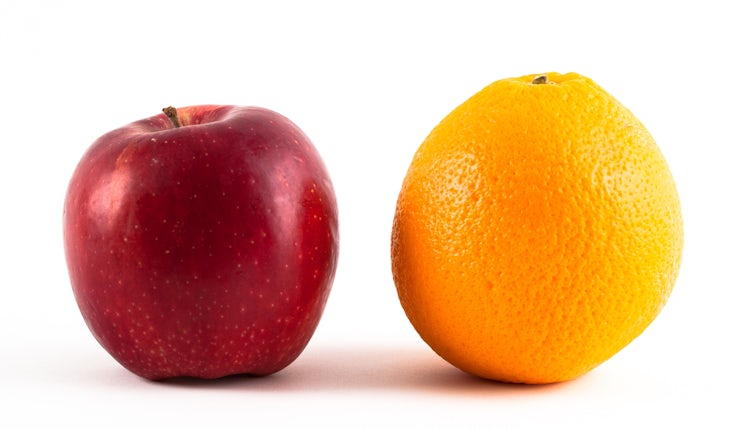Are B2B and B2C marketing really any different?
Marketing to businesses is strategically no different from marketing to consumers, but using the same tactics for both won’t be effective.

You might assume that, after 100 years, the marketing industry would have a cogent answer to the question in the headline, but you’d be wrong. Instead, we have two separate ideological factions that seem destined to disagree for the rest of eternity.
On one side, you have the ‘B2B is exactly the same as B2C’ partisans. As far as these marketers are concerned, their job is to influence the behavior of customers, and a B2C customer and a B2B marketer share the same exact brain. Because the biological hardware is the same, the marketing approach should be the same too.
On the other side, you have the ‘B2B is completely different from B2C’ folks. These tend to be B2B specialists, who believe that influencing a buying committee in a business context is nothing like selling to an individual consumer. What works for Coke will not work for IBM. Like left-handed humans, B2B marketers are forced to live in an industry that is not designed for their needs.
Three rules for more effective B2B marketing
Although we tend to prefer extremist opinions, in this case we would like to put forward a more nuanced thesis. When comparing B2B and B2C, we should distinguish between strategic differences and tactical differences.
Strategically, B2B and B2C are mostly the same. Tactically, B2B and B2C are slightly different.
The biggest difference between B2B and B2C isn’t strategic or tactical – it’s political.
Strategically speaking, there is no difference between B2B and B2C
There are generalisable principles that can predict marketing effectiveness, although you wouldn’t know it from looking at most marketing plans. If you dig into the empirical research on marketing, you will find some minor academic squabbles, but you will also find broad consensus on the big strategic questions of our time.
Effective marketing increases ‘mental availability’ by making a brand easily thought of in a buying situation. Effective marketing reaches every buyer in the category. Well-branded creative that captures attention will generate sales. Most of those sales will occur in the future, not in the short-term, since in any given category, most buyers are ‘out-of-market’ on any given day. Brands grow through customer acquisition, not customer loyalty.
Many marketers may choose to ignore these rules, but to paraphrase one of our favorite astronomers, Galileo: nevertheless, the rules still exist.
Whether it’s cloud computing or coffee, famous brands grow faster.
As far as we know, no serious researcher has ever proven that these principles fail to apply to B2B marketing. Our research with both Les Binet and Peter Field, and the Ehrenberg-Bass Institute indicates that all the same laws do apply in B2B. Whether it’s cloud computing or coffee, famous brands grow faster.
You can market a professional services firm or you can market a new mobile phone. Either way, if your ad doesn’t reach any buyers and it isn’t attributed to your brand, it sure as shit isn’t gonna work. The ‘law of double jeopardy’, which states that loyalty is a function of penetration, applies to both soft drink suppliers and airplane manufacturers.
Tactically speaking, there are some minor differences between B2B and B2C
That said, how these strategies are implemented will look quite different in B2B and B2C. Take reach as an example. ‘Reach as many category buyers as you can’ is sound strategic advice for every marketer. But tactically, the media channels that deliver on-target reach are rarely the same. In B2C, untargeted television buys continue to be one of the most effective media tactics in the toolkit. To quote a brilliant former client of ours from Colgate-Palmolive, Mindel Klein, “our target is anyone with teeth”.
If your target segment is anyone with teeth, then ad targeting isn’t particularly important. However, if your target segment is people who buy cyber-security solutions for enterprise companies, ad targeting is important (although less important than many B2B marketers assume). Firms like General Electric may win creative awards for their innovative use of Instagram, but how many jet engine procurement managers is GE actually reaching in these channels? Very few would be our somewhat-educated guess.
You should copy B2C strategies, but you shouldn’t always copy B2C tactics.
Politically speaking, B2B marketers are living in a different world
At legendary B2C firms like Procter & Gamble, Unilever, and Coca-Cola, the marketing department commands a great deal of respect and influence. These marketers are still in charge of the proverbial four Ps and make big strategic decisions that move markets.
In B2B, marketing is no less valuable, but marketers are much less valued. Whereas many B2C firms are ‘marketing-led’, most B2B firms are ‘product-led’ or ‘sales-led’.
Product leaders tend to believe that companies compete on the basis of product superiority, and that advertising is, as Jeff Bezos once said, “the price you pay for an unremarkable product”. Bezos has since recanted, and Amazon is now the biggest ad spender in the world, but his quotation is reflective of a common product mindset. And in that (naïve) mindset, marketing is nothing more than an expensive inconvenience.
Sales leaders, meanwhile, tend to be compensated on a quarterly basis, which encourages short-term, transactional thinking. All the sales department ever wants is a million cheap leads (by tomorrow!) and maybe a big client event. That’s why B2B marketers spend so much money on trade events and hyper-targeted ‘account-based marketing’. Don’t get us wrong, events and ABM can be valuable tactics, but if that’s all your marketing department does, then you don’t have a marketing department – you have a sales support function.
These are all gross generalisations, of course, but when we say this stuff to our B2B clients, we get vigorous head nods, not sharp rebukes. Many B2B marketers want to invest in long-term brand building campaigns, like their colleagues in B2C, but can’t because of internal political constraints. That’s the reality of the situation. The solution, in our mind, is for marketing to align with the finance department, which has a longer-term mindset than sales and a more commercial mindset than product.
B2B and B2C: Not so different, but not quite the same
So there you have it – our somewhat-nuanced take on the difference between B2B and B2C. When it comes to strategy, B2B and B2C marketers should follow the same rules. When it comes to executing against those strategies, B2B marketers should invest in creative, media and measurement tactics that address their unique needs. And finally, we must acknowledge the fact that many B2B marketers don’t have as much freedom to operate as their B2C peers. We need to find ways to elevate the profession so that B2B marketers can do what marketers do best: grow businesses.
Peter Weinberg and Jon and Lombardo are the heads of research and development at the B2B Institute, a think tank at LinkedIn that studies the laws of growth in B2B.






